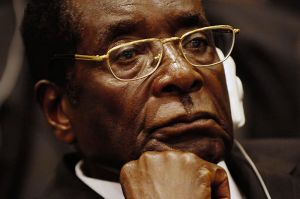15 September
2011
Afghanistan, Zimbabwe and the Just War principle
Posted in Africa, Freedom, Human Rights, Islam, Military Ethics, United States of America, World Affairs
The world has just marked with due solemnity and regret the tenth anniversary of terrible terrorist attacks upon the World Trade Center and the Pentagon. Much has been written in recent days analysing the legacy of the events to date. The most notable 9/11 outcome has perhaps been armed intervention in Afghanistan by NATO and other allied forces.
Afghanistan at the time of 9/11 was under the control of the Taliban. Its essential ideology of governance was a distorted reading of Islamic theology known as Islamism or Jihadism. This perspective was shared with the Al Qaeda terrorist organisation responsible for the 9/11 events in the U.S.A. The Taliban regime was undeniably despotic. Had invasion of Afghanistan not occurred before President Bush’s State of the Nation Address of 2002 then the Taliban regime might surely have been included as one of those governments comprising the Axis of Evil.
In the week prior to the recent anniversary the Archbishop of Canterbury announced that he was to undertake a visit to Zimbabwe. The government of Robert Mugabe and Zanu PF are not generally accused of supporting or harbouring extraneous terrorist organisations, but it has manifested a disregard of Taleban proportions for the basic human rights of its citizens. Individuals’ rights to hold property, to have and voice opinions, and to receive a fair and just hearing when accused of a criminal or civil offence, have not been upheld but rather violated repeatedly. Zimbabwe’s government has oppressed and terrorised, seeking rather to dominate and control than to serve. It can only be described as despotic.
The Archbishop is not to make his visit in representation of Britain. His purpose is pastoral, Zimbabwe having a large proportion of Anglicans among its people. He has, however, indicated that he would like to meet President Mugabe. If he gets his meeting he will have to take care as Mugabe has a well-deserved reputation for taking advantage of such meetings with significant visitors.
The invasion of Afghanistan in October 2001 is commonly regarded as justified. The former Chief of Defence Staff, General Lord Guthrie of Craigiebank provided a clear summary of six criteria by which a war can be considered ethically just.
The first of the six is Just Cause: defence of one’s own nation or of allies unjustly attacked, or need to correct grave wrongs like genocide, systematic torture and denial of fair justice. Many would argue that there was just cause for intervention in Afghanistan not only because of the need to restore order and justice, but also, following the 9/11 attacks, a need to pre-empt further such attacks being co-ordinated by Al Qaeda from within that country. The second of the six criteria is Proportionate Cause. Here again it was held that the inevitable evils of war were outweighed by an anticipated betterment of conditions for the populace following intervention.
Right Intention is the third criterion. General Lord Gutherie wrote: ‘Our purpose in going to war must genuinely be to help create a better subsequent peace than there would otherwise have been. That plainly disqualifies revenge, or the annihilation of an enemy people, as legitimate aims.’ The subsequent peace that is a requirement of Right Intention must be of benefit not only to the nation(s) undertaking military intervention, but also be to others. Most importantly it must apply to the Nation inside whose borders military action is taken. It can be held that intervention in Afghanistan accorded with this principle.
The fourth criterion is Right Authority. Historically this has been deemed the prerogative of an individual Nation State. The twentieth century saw the birth of NATO and the UN Security Council. General Guthrie writes sceptically of the UN Security Council, arguing that it is subject to undue influence or politicking. He believes that NATO- instigated action in Kosovo was a just war regardless of its lacking UN Security Council involvement. In the case of Afghanistan the UN Security Council, NATO and a plethora of Nation States consented to the invasion.
The last two criteria are a Reasonable Prospect of Success and Last Resort. The prospect of success is not predicated upon military victory. Last Resort is not understood as posterior to all other means, but rather as ‘least preferred’. The intervention in Afghanistan again arguably meets these two criteria.
Military intervention has succeeded in restoring or creating a more just order in some parts of Afghanistan. Allegations of corruption made against the current Afghan government do not of themselves necessarily diminish the considerable improvements achieved for many Afghans. The achieved outcome with regard to Al Qaeda is that Afghanistan has ceased in good measure to serve as a ‘safe-heaven’ from which terrorists may operate elsewhere.
There are then reflective people who hold that, according to the six criteria or principles of jus ad bellum more or less as set out by General Guthrie in his book Just War, military intervention in Afghanistan was justifiable.
Application of the same criteria to Zimbabwe might seem to some prima facie to justify military intervention there. It is, however, virtually inconceivable that such action will be undertaken. Mugabe is not harbouring Al Qaeda, nor is his government an obvious or grievous threat to the people of any nation other than his own.
Zimbabwe is not alone among nation-states in apparently meeting some or all of the supposed criteria for just intervention. The brutality of Mugabe’s government is blatant and on-going, while sanctions and travel-bans have failed. It is unfortunate for Zimbabweans and others suffering under ghastly and selfish regimes that the presence of post-colonial guilt seemingly inhibits Western governments from taking action to assist the oppressed. A fear of being portrayed as neo-imperialistic, especially by other post-colonial despots who enjoy a better press than Mugabe, has resulted in foreign-policy and military inconsistencies.

Leave a Reply to Panama foundation Cancel reply